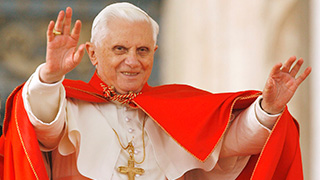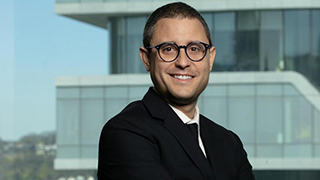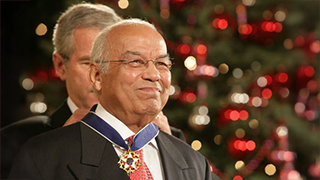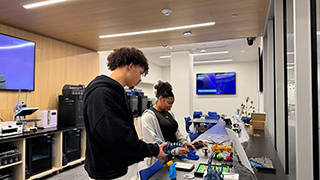Faculty Reflect on the Legacy of Pope Benedict XVI: Collaboratively Seeking Truth - Seton Hall University
Thursday, January 12, 2023

"Pope Benedict XVI … called upon universities and study centers to take the lead and become places for a candid exchange of religious ideas. For Benedict XVI, the university has always been the house where one seeks the truth proper to the human person," wrote Ines Murzaku, Ph.D., director of the Catholic Studies Program and professor of religion, in a recent article in The Catholic World Report.
"We in Catholic Studies at Seton Hall, from the inception of our program, have made a concerted effort to be a seedbed of truth seeking – of finding truth through collaboration and dialogue," said Murzaku.
While each Catholic Studies faculty member, coming from a different discipline, has a unique perspective on Pope Benedict XVI's influence on academic pursuits, all agree that their research and pedagogy has been shaped by his emphasis on seeking truth as a collaborative effort.
Nancy Enright, Ph.D., director of the University Core and professor of English, shared how the thought of Pope Benedict XVI has influenced her teaching during the current academic year: "Pope Benedict XVI was a true scholar, and his Deus Caritas Est (God Is Love) is a fine example of deep religious scholarship. This text, required in Core 1: Journey of Transformation, is a powerful exploration of the meaning of the phrase found in 1 John, 'God is Love.' Benedict traces the concept of love to its Greek origins, particularly focusing on two of the Greek words for love – eros and agape. One recalls C. S. Lewis' book The Four Loves and the masterful treatment he gives to each form of love. Benedict, by contrast, explores only two of them, as well as how the Jewish and then Christian understanding of love differs from that of the Greeks and Romans. He also, most importantly, examines how the two forms of love, eros and agape (or receiving love and giving love) are both intertwined and both necessary. He wisely explains that eros must be informed to some degree by agape or it will not continue to be love at all, and he also states that no one can only give love, so even agape must in some ways be tempered by eros. In Core I this past semester, students got a lot out of this text, and quite a few chose to write about it. May Benedict rest in the arms of the God of Love."
Reverend Gerald Buonopane, Ph.D., Minister to the Priest Community and senior lecturer of chemistry, who has developed the Catholic Studies course Science and Theology of Food and regularly teaches Catholic Studies courses, reflected on the election of Pope Benedict XIV, as well as how the late pontiff's thought and ministry have influenced Fr. Buonopane's own scholarship and ministry: "I recall on April 19, 2005 (when Benedict was elected and announced to the world) I was in a lounge in the basement of Immaculate Conception Seminary all alone with the TV on, watching the proceedings from Rome. I was so hoping and praying that Cardinal Ratzinger would be the new pope. When his name was announced and he 'appeared' to the world, I cried tears of joy. Like most people I only observed and 'met' Pope Benedict from a distance but had such great love and admiration for him. When I present Deus Caritas Est (as I did years ago in Journey of Transformation) and now in Science and Theology of Food, I am always in awe of how Pope Benedict brings the gift of love to life and speaks to ALL people of ALL ages what Christian love is all about! May more and more people be truly touched by his writings! Hopefully more of them will come.
"I see this photo every Saturday morning when I celebrate 7:00 Mass for the Missionaries of Charity in Newark. It is on the wall in the sacristy in their convent. The two nuns in the photo are Sister Mary Prema Pierick and Sister Nirmala Joshi. Sister Mary Prema is the one the pope is speaking with. She is of German origin (they are probably speaking in German) and was Superior General of the MCs at the time. The other nun is Sister Nirmala Joshi, the predecessor of Sister Mary Prema. I love the photo, especially where Sr. Nirmala is touching Sr. Mary Prema, who is touching our dear Pope Benedict! A beautiful connection of love!"
Reverend Cesar D. Jaramillo, J.C.L., adjunct professor of Catholic Studies and for Immaculate Conception Seminary School of Theology's Center for Diaconal Formation, penned an article to be published in the next issue of The Beacon, the newspaper of the Diocese of Paterson, stating: "It is no secret that the brilliant intellect of Pope Benedict XVI will constitute his greatest legacy for generations to come, not only of theologians but of every baptized person who desires to conform fully to Christ through a personal encounter with Him. The clarity and simplicity with which the late Pontiff expounded the immeasurable richness of the deposit of faith and the magisterium of the Church, in the biblical, dogmatic, and pastoral fields, through his conferences and writings, is a gift from God to every person that seeks to live out his or her discipular identity fully and wholeheartedly. … Undoubtedly, his 71 years of priesthood and his pontificate have left an indelible mark [on] the life of the Church he so loved and served, with total selflessness and generosity. … 'I prepare not for an end, but for an encounter' said Benedict XVI shortly before his death. The nobleness of his words, of his actions and of his unwavering faith in a God who is Love will be the two pillars on which the memory of this great giant of humility will rest."
Murzaku discussed Pope Benedict XVI's desire to bring believers in the world's religions together in a common search for truth. In her recent article in The Catholic World Report, she explained: "The pope invited a delegation of Muslim scholars to Rome, which started an epochal theological dialogue with Islam. … The correspondence between the pope and the Muslim scholars led to the creation of the Catholic-Muslim forum. … The pontiff [was] promoting a theological dialogue in search of truth, making a convincing argument that although the theologies and the ways of approaching truth might be different for different religions, the process of truth seeking via interfaith, interreligious dialogue, and exploring life's deeper theological questions from the point of view of one's own faith tradition, can build a solid foundation for peace and security. Truth and peace are two sides of the same coin; the splendor of truth leads to peace and peaceful coexistence. … For Benedict XVI, interreligious dialogue – besides being an inviting, candid, and truth-seeking dialogue – is also a dialogue of understanding."
"This is, in a nutshell," Murzaku summarized, "Pope Benedict XVI's legacy: interreligious dialogue where truth seeking, listening, and understanding take absolute priority."
Categories: Education, Faith and Service






